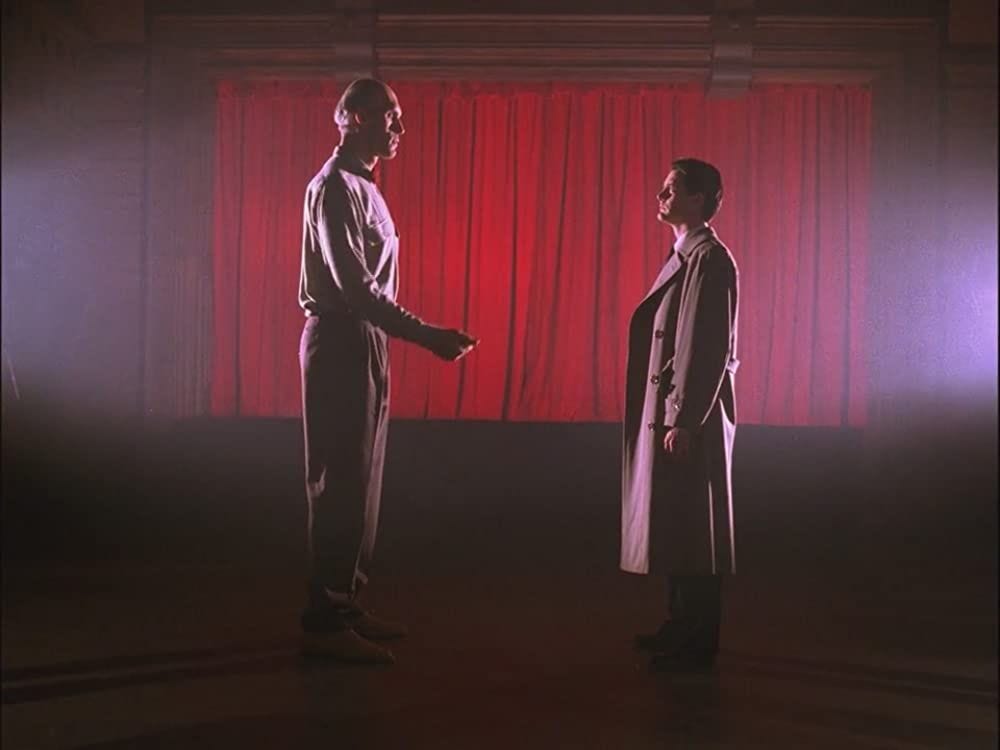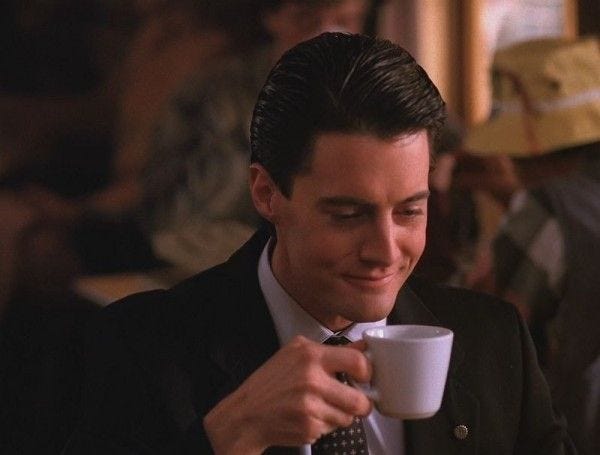exploring the wonderfully surreal world of 'Twin Peaks'
'I feel like I'm going to dream tonight.'
Twin Peaks is a show that comes along once in a lifetime - if that. David Lynch and Mark Frost created a show whose existence seems to be contradictory to its very core: comforting yet sinister, idyllic yet menacing, sheltered yet infernal, Twin Peaks tells the story of the murder of Laura Palmer and the tumult she leaves in her wake. Although the show is usually described as a murder mystery, Twin Peaks seems to defy genre classification - even though it begins with Laura Palmer’s death, her life and legacy seem to permeate the show’s every frame, as opposed to her murder merely serving as Twin Peaks’ impetus. From the opening scene all the way to the show’s final minutes, Laura Palmer’s murder hangs in the air, her memory something that can be likened to a harbinger of evil to come, an omen for the forces of darkness that would soon arrive in the small, picturesque town of Twin Peaks. Her life - one that seems deceptively idyllic and transparent at first glance - is never shown to the audience beyond the nostalgia-filled air of videotapes viewed in interrogation rooms and fond - and sometimes not so fond - anecdotes from various characters in the show. In spite of the audience never actually seeing the living, breathing version of Laura Palmer in real-time, as the show progresses and we learn more about her the audience begins to grieve for Laura’s lost life and innocence more than would be expected. This is the crux of the Twin Peaks: David Lynch’s ability to inspire profound empathy and emotion for characters who range from dead to alive, from sane to insane, from evil to angelic, is something to be held with great wonder and reverence. Twin Peaks is not a murder mystery - no, Twin Peaks is a genre-defying, Dali-esque dream - or nightmare - of a show that ended the era of passive TV watching with a swift blow, leaving audiences around the world with music, characters, and a small world in their heads they couldn’t forget even if they tried.
Upon its release in 1990, Twin Peaks was novel in more ways than one. Its surrealistic, hallucinatory nature was one thing, but the commitment it required of its viewers was another. Of course, long form TV entertainment had existed - Dallas, All My Children, and General Hospital, to name a few - but these shows, despite their individual episodic length, were still more similar to sitcoms like Cheers and Golden Girls in that you could drop in any episode, any season without having viewed the show previously, and you wouldn’t be too far behind plot-wise. Twin Peaks introduced a new style of TV watching - one that required some mental exertion and effort to understand the story, and one that required some commitment to follow the plot linearly. Viewing a random episode without watching the pilot would render a new watcher confused, bewildered, and wondering why on earth - for example - a beautiful singer just morphed into a giant in an atmospherically lit bar set to dreamy music, a woman tenderly cradling a log looking on in the background. Surrealistic scenes like these have profound emotional messages behind them, but to a viewer dropping in for a casual watch, any emotional depth and profundity is rendered absurd rather than beautiful.
The relatively avant-garde nature of Twin Peaks at the time of its initial release meant that the more abstract, dreamlike aspects of it had to be balanced with groundedness in every other aspect of the show. Twin Peaks managed to do just that: the show’s character writing, tone and plot all let the audience fall into small town life in Twin Peaks with ease - which makes the various twists and turns all the more shocking and effective. Many casual viewers of the show watch the pilot and immediately write the show off as too slow and uneventful, which is ironic considering the pace at which Twin Peaks moves going forward. Although the pacing remains consistent throughout, familiarity and connection with the characters makes the show feel much more rapid and quickly moving than it actually is - and part of this (a rather significant part) is owed to the remarkable balancing of the various storylines. The supernatural, darker storylines are perfectly balanced with those that pay more attention to character drama and relationships - platonic, familial, and otherwise. This balance not only gives the viewer a rest from the increasingly menacing and ominous plot, but also serves as a way for the show to emphasize and juxtapose the many genre-bending storylines against one another. While Dale Cooper is investigating Laura Palmer’s grisly murder and another girl’s horrifying, traumatic attempted murder, waitress Shelly Johnson deals with an abusive boyfriend, caught in a love triangle with another character.
Many storylines in Twin Peaks are violent in some way - physical, emotional, or otherwise - which helps reinforce one of the messages that seems to be so prevalent in the show: violence is violence - its true nature doesn’t vary from situation to situation. Whether found in a supernatural murder or in abusive relationships, the ugliness of violence is something that remains consistently sinister. Many directors in the film industry utilize violence in film to condemn it (Quentin Tarantino, Peter Bogdanovich, and Oliver Stone, to name a few), but I feel that David Lynch and Mark Frost accomplished this goal much more effectively and viscerally than any of their peers. The audience comes to deeply empathize with characters that seem to be straddling the line between good and evil, lucidity and incoherence, or even life and death. We witness characters at their worst, yes - but at their best, at their most wonderful, the characters of Twin Peaks are inspiring in their kindness, compassion, and empathy. This, coupled with the wonderful atmosphere cultivated by nearly every aspect of the show, make violent occurrences even more disturbing and horrible than they already are. The town of Twin Peaks seems to be too whimsical, too innocuous to be a setting for such evil and debauchery as it eventually becomes. We don’t only grieve for life lost, we come to grieve for what could’ve been, for lost potential.
Although Twin Peaks has an ensemble cast, one can’t talk about Twin Peaks without talking about Dale Cooper, who is indubitably the favorite character for the majority of those who’ve watched the show. His character not only functions as a way to move the plot forward, but also as a way to bring some levity and pure-heartedness into what is otherwise a very dark show. Innocent and sly, funny and sincere, introspective and charismatic, Dale Cooper is a perfect combination of all the best parts of Twin Peaks. At the show’s start, Dale seems to be a very cut-and-dry cop character - emotionless, athletic, and driven to obtain justice wherever he can, the audience is led to believe that his character will be one that is predictable and formulaic. As the show progresses, however, Cooper increasingly seems to become a walking contradiction - rational, yet unafraid to rely on that of the spiritual and ephemeral; stoic, yet enthusiastically and openly espousing the importance of daily self care; gentle, humble, and caring, yet dangerous and unmoving when need be, Dale Cooper becomes a character that can be described as anything but predictable - and in spite of that, or perhaps, because of that, we adore and welcome his presence on screen.
The insular, homely world of Twin Peaks and its characters is one that is impossible to not fall in love with. Every aspect of the show made sure of that, utilizing everything from the soundtrack to the screenplay to make sure that by the end of the show, or even the pilot alone, the audience would fall in love with the atmosphere and characters. Twin Peaks moves slowly - at least in the first episode or so - and its unhurried, leisurely nature made sure that when tragedy struck, the audience would be struck with a gut punch right along with its characters. Horror and beauty, grief and joy, romance and violence, surrealism and realism - all of these are inexorably intertwined with one another in life and in the bizarre world of Twin Peaks, and the creators of the show used this undeniable fact to push and pull on the audience’s mind and emotions, making for an extremely entertaining and thought-provoking, if not painful journey. There is value to be found in the Golden Girls and Cheers of the world, but shows like Twin Peaks leave behind a prodigious legacy - after all, it’s been over thirty years, and discourse runs wild about it still. Whatever Twin Peaks’ purpose and message was, there’s no denying that it not only left a mark on the world of film and television, but also on viewers around the world. And, after all, this is all we can ask of the shows and movies we watch - for them to affect us for more than the thirty-odd minutes we spend in front of the television from week to week. Twin Peaks accomplished this lofty goal with such charm and ease from the very first episode that watching the rest of the show feels as natural as breathing. Despite Twin Peaks being a famously emblematic piece of surrealist television, amorphous and unclear in its purpose and story, one quote from the show sums it up wonderfully - weirdness, novelty, excitement, and all: ‘I have no idea where this will lead us, but I have a definite feeling it will be a place both wonderful and strange!’






In a naturally flowing manner you command the use of sophisticated words to express your deeo understanding and interoretation of what others see as and trivialize as mere "cool" stuff. Thank you for your beautiful ideas - you seem to have an unusually deep and broad level of culture .